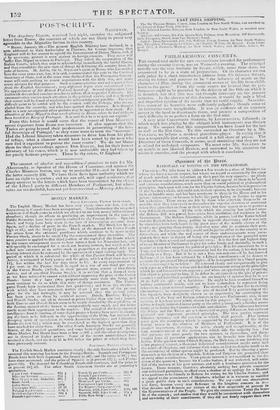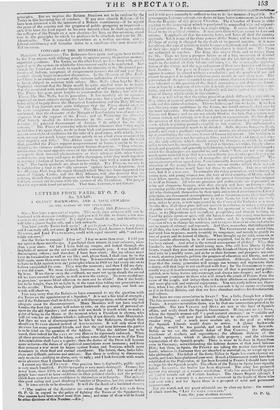Opiniond of tfic Pre6d.
R.tTIONALE OF VOTING ON T111: SPEAliERSIIIP.
Courttita—We take leave to address a few weeds to a class of Members for whom we have a sincere respect, but whom we regard as occasionally the cause of much mischief, with intentiona on their part the very opposite : we allude to those whose votes proceed on amiable, and what appear to them to bentoral and virtuous consideratious, much more than on sound political or philosophical principles. Stugi men wiil vote for Sir Charles Sutton, because be is in possession of the Speaker's chair, and ought not, in their opinion, to be displaced ; because he is an amiable man, and has been courteous to them in the House and in his private intercourse ; or because it looks like party feeliug Or faction to oppose his reelection. These views are felt by those who entertain them to be so
that they tile cicala to themselves for superior elevation of sentiment when they give t ffect to them in their votes; but they appear to us to possess a very (litre: cot character. All the evils .which the country has suffered since the Reform Bill was pissed. have arisen from vacillation and weakness in the Government. 'I he Reform Ministries, while in power, had the Tories behind and the Radicals before them, pulling in opposite ditections; and it was only by stretchine forth both hands to the great mass of the middle classes of the
ophe and grasping them firmly, that they Were able to tuaisitaite their posi- tion at all. In this condition they could not do justice either to the country or to throiselves; anal while the real causes of their emberrassments were unex- plained, they were in danger of losing the support even of the powerful arms that Comical their tritural and appropriate sway. It ie the first and highest duty of every Alember of Parliament to give his votes firmly and decidedly, in such a mower as may best support his political priariples. If in his conscience he is •a Ti.ry, and believes a firm Tory Government best for tile nation, it his duty to act deeidedly ate a Tidy. But it be is not a Tory out-and-out—if he has !intend Itef at ati—if lie has been returned by a Liberal constituency—if Ile deaires to I remote the progress of liberal principles—if lie is respon.ilde to a liberal people, 51 Ii It course ought he to follow! Ile is bound clearly and unequivocally to give .11(.11 vows as will realize a firm and decided Government acting on the principles which he and lit coastiments approve; and when an opportunity of promoting this object is preseuted to him, if he defeat its attainment on the plea of private. courtesies and individual amiabillities, we are humbly of opinion that he is nut it to hold tie c2liee of a legislator. Ile ought to have confined himself to 'writing sentimentel novels, and not to have nadertaken to represent living it.terera in a great tic tic assembly. The election of a Speaker has in existing eirennastalmeajim cousequence of the acts of decided 'Lery. partisanship of the Lae :!:.peaker, hee.a designedly chosen as an opportunity for ascertaining the stra . aet tit of the Tory and Reform interests in the new Parliament; and, in our opioaiii. it has been IIIIIst %vilely chosen for this purpose. We repeet, that the nation is deeply interest, d in Olin party or the other g lining such si decided ascen- dancy as to render the Government stable and cilicieut. Medd-fere:ices between the Whigs and the Tories are net theoretical or party differences, but embrace prefeniel and important practical principlee. The two parties represent differeat syeteaus ; end the mication is which shall prevail. That systeuek most gain the itscendaucy which is supported by the majority of the nation lieving voices in the electioa of Members of Parliament. It is of the !.zrtate,t it:Torte:ice, then-fare, to sena:, clearly anal imequivocally, at the very commeneentent of the ses-ion, on which side the majority lies. For this puepose, the 1110fe purely the two systetns, Iii themselves, and &sell - taugleal Ilona all particular applications, can be brouelit into the field, the better. If the question were Church lleforin, the Malt-tax, or one involving any ether practical cite-rest, a thousand individual considerations might enter into the. mind- of and eitluence their votes, so that no defitlite result as to the ascendancy of either system might be produced. But by choosing a pies- thin such as the election of a Speaker, Reform atui Toryism are presented clear of every other censideration. Even private interest is not sacrificed in the de- ciaion of the question ; because Sir Charles Sutton, if not reelected, will retire full of the renown of his past services, and with a handsome provision for the future. There remains, therefore, absolutely nothing hut private courtesies and individual partialities, to afford even a shadow of an apology for a Member who professes to be friendly- to Reform for voting for Sir Charles Sutton; and we appeal to the consciences of 'Members, whether it is virtuous to sacrifice a great public duty to such considerations. We say—and our observation Ins force, because every true Reformer in the kingdom concurs in it-7- that decision and firmness are virtues of the first magnitude at present in the Representatives of the People. We give the conscientious Tories the bene- fit of the remark ; and confess that they would be inconsistent with themselves and unworthy of their constituents, if they did not firmly support their Own principles. But we implore the Reform Menders not to be outdone by the fories in this becoming line of conduct. If auy man cherish Reform—if he have been intrusted with the interests of a Re-fm in constituency—if he regard the peace of the country and the progress of public prosperity as important-- and, if he have the least regard to his men interest when he shall again solicit Site mat :ems of the People on a new election—let him, on this occasion, stand true to the principles to which be professes to be attached, and vote for Mr. Abncrontity. This is regatde.d everywhere as a lestioy question, and um Liberal constitueucy will hereafter listen to a candidate who now &setts thv llt f _1111 CallS11.
CONCORD OF THE MINISTERIAL PRESS.
MonNING Cat:tr.:rear—The Reformers have again and again been to by the Tery organs with differing greatly in opinion among themselves on mane iMportaut questions. The Tories, on the other haild, we !my-. been told, are all :tweed as to the system on which the Government ought to be conducted. But thtatAli the Tories are all ready to vouch for the sincerity of the Miaisterial pro. tessioae of Reform, symptoms of disagreement between the old and new Tory ieernale already begin to manifest themselves. In the ..11.:Noirs of .21.res. thete is an amusing account of the virtuous indignation i■f eertoin at being obliged to associate with others. Mrs. Wells ( then kept hr M.:;er Tophatit) tdiserved that the Major would be quite Omani were he to know that sl,e associated with another theatrical damsel of still more crazy reputatiem The Times tuts gone great lengths to ;recount-iodate the Duke ; Ion: still the .Thers, like Mrs. ‘Vells, lets its punctilios. It has manfully ate its opinioes expreesed on most subjects eluting the last finir years, but it made wry fee., et heine obliged to gulp down the Marquis oh Londonderry and 'the lloly .1L . The old Tory journals were quite indignant that the Times should .:0!!•! !•! 'he teem scrupulous than themselves. The iloroiop Post and the exclaimed, that the character of the Marquis of Londonderry was of tee:- e sequence than the support of the Times ; and on AVeilnesilay the lust bitterly assailed its fellow-labourer in the eause of Tory 1 ee, the mine the paternal Covet nment of A uetlia " tit subject for - sereaetti." The Times of yesterday tells its fellow-labourers that " flee o to feel that if we spare them, we do so from high and generous motive,. hoe our own right of retaliation for the sake of a good cause, with which. • ever, we may tint much longer continue quit-thy to see a bad close associate,' by their impoliey and folly." The Aibion scents to have settled into the belief tJtat, provided the noes support misgovernment at home, it ought to le. ia- (Weed io its virtuous indignation against foreign despotism. " They At he en- tertain even the most opposite views of the character of foreign Government-e :es resperts their internal administration or their relations with other Cowl- nental states. may very well agree to differ thereupon, while they work together in resistioe a faction at home, whose baseness they view with c /lumen detest& tion." The thornily quarrels are about to be settled. The Times is, we see. III
hm indulged thr a time in its " eareasuas " against Austrian despotism. And
the AL roilly Post, long the organ through which Minieteis have supported the cause ef Miguel, Carlos, and the Holy Alliance, Will also tfiecover that its petiens, tiemgh they could dispense with Sir George Murray's services in the
cahhjet, cannot yet dispense with the cervices of the Thuntlerer. The proper tittle for separation is not yet arrived. That time, however, is not distant.



























 Previous page
Previous page